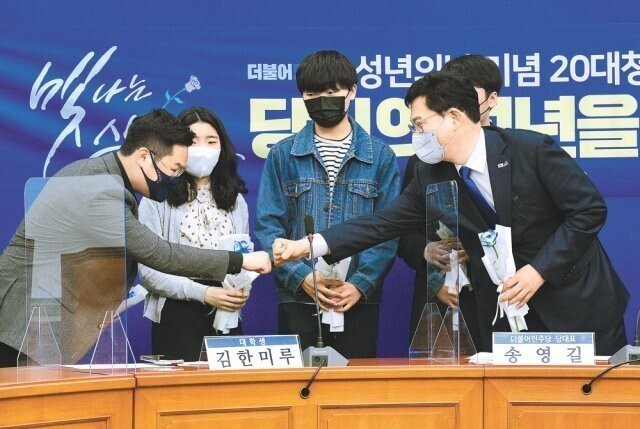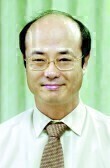hankyoreh
Links to other country sites 다른 나라 사이트 링크
[Column] Why millennials turned their back on Democratic Party


By Seong Han-yong, senior staff writer
“Generational voting” is a term that reflects how electoral support for various candidates and parties varies with voters’ age.
In the 2002 presidential election, many people in their 20s and 30s voted for Roh Moo-hyun, while many in their 50s and 60s voted for Lee Hoi-chang. Results were mixed for those in their 40s. The generation gap didn’t completely replace the regional divide.
There wasn’t any generational voting in the 2007 presidential election and the 2008 parliamentary election, which were landslide victories for the conservative Grand National Party — today known as the People Power Party.
But there was clear evidence of generational voting in the 2010 local election. Aside from Daegu, North Gyeongsang Province, and the Jeolla provinces in the southwest, people in their 20s, 30s, and 40s largely voted for the liberal Democratic Party while people in their 50s and 60s largely voted for the Grand National Party.
That same pattern persisted in the Seoul mayoral by-election on Oct. 26, 2011, the parliamentary and presidential elections in 2012, the local election in 2014, the parliamentary election in 2016, the presidential election in 2017, and the local election in 2018.
Koreans in their 20s, 30s, and 40s seemed to be a perpetual base of support for the Democratic Party. It was in July 2018 that Lee Hae-chan declared while campaigning to become party leader that the Democrats would stay in power for a generation.
The change came in 2019, beginning with the Cho Kuk scandal. When pollsters asked Koreans whether Cho was fit to be justice minister, Koreans in their 20s tended to be opposed to his nomination, unlike those in their 30s.
Opposition was overwhelming among men in their 20s, who had turned their backs on the Democratic Party. That was partly an expression of an intensifying gender conflict.
There wasn’t a noticeable defection of 20-somethings from the Democratic Party in the 2020 parliamentary election. Korea was in the middle of the COVID-19 pandemic at the time.
There were still some indications, however. Koreans in their 20s were less likely to vote for the Democratic Party than those in their 30s and 40s. That contrasted with previous elections.
If the Democratic Party had been clear-eyed, it could have detected the signs of crisis at that moment. But it wasn’t that clever.
The wounds of the Cho Kuk scandal may have been covered by COVID-19 and the parliamentary election — but they were still festering.
In a debate organized by the Democratic Party after the election, Professor Jung Hae-gu attributed the party’s victory to active participation by people in their 20s, 30s, and 40s. Jung defined the world that those voters want as follows:
“I think the most important thing in their lives is improving their socio-economic conditions while enjoying individual freedom and happiness. These young people haven’t received opportunities commensurate with their efforts. It’s particularly important to provide them with conditions and opportunities, including jobs, that will enable them to maintain a decent life in society,” Jung said.
But after the election, the Democratic Party ignored Jung’s recommendation and did little for young people. In effect, the party pocketed the votes of people in their 20s, 30s, and 40s without creating the world that they wanted.
In that sense, the outcome of the Seoul mayoral by-election on April 7 was preordained. The fortress that the Democratic Party has been building for the past ten years turned out to be a sandcastle.
And the party has nobody to blame but itself. It’s the price the party must pay for being so incompetent, lazy and shameless. Koreans in their 20s and 30s — basically, millennials — haven’t betrayed the Democratic Party; they’ve been betrayed by the Democratic Party.
The rage of millennial voters is indiscriminate. If the People Power Party (PPP, the conservative party’s latest incarnation) had been in power, it would have faced their wrath.
But the Democratic Party is currently in power, so it has no excuse for feeling wronged. If the people view you as the establishment, then you’re the establishment, and it’s pointless to deny it.
An even greater crisis lies ahead for the Democratic Party: the presidential election, which is coming up on March 9, 2022.
The fact that a 36-year-old was elected to lead the PPP suggests that the outcome of the Seoul mayoral by-election could be replicated in the presidential election next year.
If millennials support the PPP, the Democratic Party has no hope of staying in power.
There are indications that millennials haven’t completely rejected the Democratic Party yet. In recent polls, the two major parties received similar levels of support. But a closer look at the results shows that millennials favor the Democratic Party over the PPP.
And in polls for likely candidates for president, millennials tend to prefer Gyeonggi Province Governor Lee Jae-myung, a member of the Democratic Party, over former Prosecutor General Yoon Seok-youl, who is expected to represent the PPP in the election.
That could mean that millennials will exercise a casting vote in next year’s presidential election. That would be lucky for the Democratic Party.
What is the Democratic Party to do? It doesn’t have anyone as charismatic as Lee Jun-seok, the 36-year-old head of the PPP. And it took the PPP ten years to cultivate someone like Lee.
The Democratic Party needs to change its mindset. Party leaders and presidential candidates should compete not on their age but their values, policy and party line.
President Moon Jae-in’s idea of fairness clashes with millennials’ liberal tendencies. The Democratic Party needs to show a little more respect for the individual. They should prioritize equality rather than fairness.
The issue of jobs for young people isn’t something that can be fixed all at once by a single person — not even the president. It can’t be done by the Moon administration or by the next administration, whether it’s led by Lee Jae-myung or by Yoon Seok-youl.
That’s an issue that the Korean government and Korean society need to solve together. It will require honesty and persuasion.
Please direct comments or questions to [english@hani.co.kr]

Editorial・opinion
![[Column] Life on our Trisolaris [Column] Life on our Trisolaris](https://flexible.img.hani.co.kr/flexible/normal/500/300/imgdb/original/2024/0505/4817148682278544.jpg) [Column] Life on our Trisolaris
[Column] Life on our Trisolaris![[Editorial] Penalties for airing allegations against Korea’s first lady endanger free press [Editorial] Penalties for airing allegations against Korea’s first lady endanger free press](https://flexible.img.hani.co.kr/flexible/normal/500/300/imgdb/original/2024/0502/1817146398095106.jpg) [Editorial] Penalties for airing allegations against Korea’s first lady endanger free press
[Editorial] Penalties for airing allegations against Korea’s first lady endanger free press- [Editorial] Yoon must halt procurement of SM-3 interceptor missiles
- [Guest essay] Maybe Korea’s rapid population decline is an opportunity, not a crisis
- [Column] Can Yoon steer diplomacy with Russia, China back on track?
- [Column] Season 2 of special prosecutor probe may be coming to Korea soon
- [Column] Park Geun-hye déjà vu in Yoon Suk-yeol
- [Editorial] New weight of N. Korea’s nuclear threats makes dialogue all the more urgent
- [Guest essay] The real reason Korea’s new right wants to dub Rhee a founding father
- [Column] ‘Choson’: Is it time we start referring to N. Korea in its own terms?
Most viewed articles
- 160% of young Koreans see no need to have kids after marriage
- 2New sex-ed guidelines forbid teaching about homosexuality
- 3Presidential office warns of veto in response to opposition passing special counsel probe act
- 4How daycares became the most viable business for the self-employed
- 5[Column] Life on our Trisolaris
- 6Months and months of overdue wages are pushing migrant workers in Korea into debt
- 7[Guest essay] Maybe Korea’s rapid population decline is an opportunity, not a crisis
- 8Bills for Itaewon crush inquiry, special counsel probe into Marine’s death pass National Assembly
- 9OECD upgrades Korea’s growth forecast from 2.2% to 2.6%
- 10Gangnam murderer says he killed “because women have always ignored me”